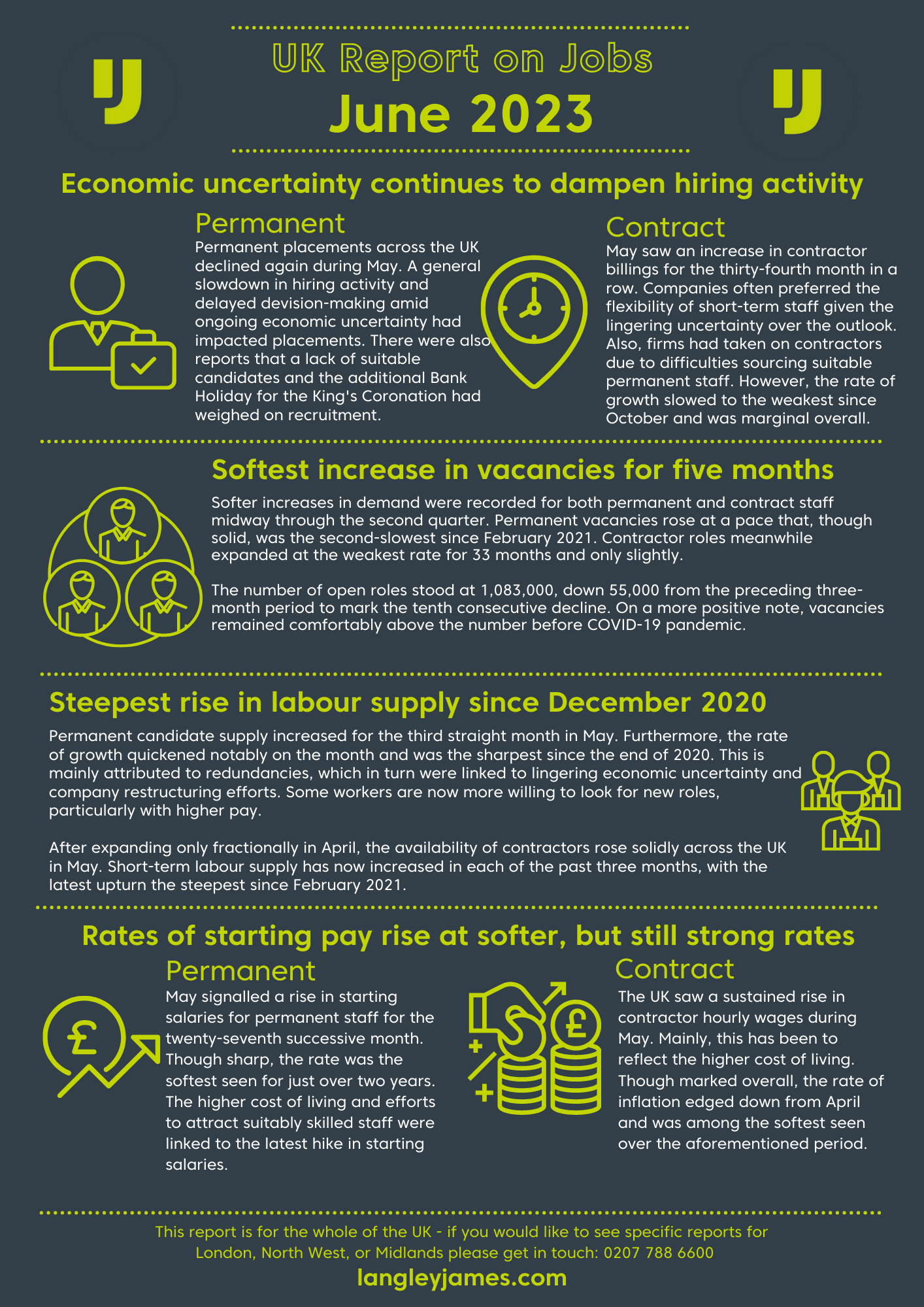
Jun 28, 2023 | Hiring Resources, IT
In today’s competitive IT landscape, hiring managers face a significant challenge—the ongoing IT skills crisis. The demand for skilled IT professionals continues to outpace the supply, making it increasingly difficult to find and secure top talent. However, with the right strategies and innovative approaches, hiring managers can successfully navigate this crisis and build a high-performing IT team. In this blog post, we’ll explore some effective solutions to help you overcome the IT skills shortage and find the ideal candidates for your organisation.
Hiring Mangers Should Embrace the Gig Economy
Incorporating the gig economy into your talent acquisition strategy can be a game-changer. By leveraging IT contractors, you can access a pool of specialised talent on-demand. This flexible arrangement allows you to quickly fill skill gaps and tackle short-term projects without long-term commitments.
Foster Internal Talent Development
Investing in the professional growth of your existing employees can be a strategic solution. Implement training programs, certifications, and mentorship opportunities to upskill and reskill your current team members. By nurturing internal talent, you can fill crucial roles internally and create a culture of continuous learning and advancement.
Tap into Professional IT Networks
Engage with professional IT networks, industry associations, and online communities. Participate in relevant events, conferences, and webinars to connect with IT professionals actively seeking new opportunities. Building relationships within these networks can provide access to a diverse pool of talent and valuable industry insights.
As a Hiring manager You Need to Leverage Social Media and Online Platforms
Harness the power of social media and online platforms to expand your reach and attract top IT talent. Maintain an active presence on platforms like LinkedIn, GitHub, and Stack Overflow. Share engaging content, job openings, and insights about your organisation’s work culture to create a strong employer brand and attract the attention of skilled candidates.
Collaborate with IT Recruitment Specialists
Partnering with an IT recruitment agency can be a strategic move. These specialists, like us, possess in-depth industry knowledge, an extensive network of IT professionals, and expertise in candidate sourcing and screening. They can streamline your recruitment process, saving you time and effort while connecting you with the right talent.
Offer Competitive Compensation and Benefits
To attract and retain top IT talent, it’s crucial to offer competitive compensation packages and attractive benefits. Stay up-to-date with market trends to ensure your salary offers align with industry standards. Additionally, consider flexible work arrangements, professional development opportunities, and perks that cater to IT professionals’ specific needs and preferences. Take a look at our latest IT Salary Guide to get up to date on the current salaries on offer for the most popular jobs in IT.

Hiring Managers Need to Streamline the Hiring Process
In a competitive talent market, a lengthy and complex hiring process can deter top candidates. Simplify and streamline your hiring process to ensure a positive candidate experience. Minimize unnecessary steps, provide prompt feedback, and communicate clearly with candidates to expedite the decision-making process.
Showcase Your Organisation’s Technological Advancements
Demonstrate your organization’s commitment to innovation by highlighting the exciting projects, cutting-edge technologies, and advancements in the IT space. Showcasing your technological prowess and the opportunity for IT professionals to work on meaningful and impactful projects can attract top talent and position your organization as a desirable employer.
Why Hiring Managers Should Work With Langley James
Here at Langley James, we know our candidates. We have in-depth knowledge of their experience, down to the individual projects they have worked on, their strengths (and their weaknesses). We have access to those details that you just can’t get from a CV alone.
Our talented and specialised consultants work hard to ensure that any candidates we send you are not only a perfect match for the role but your business.
To discuss your IT recruitment needs please call us on 0207 099 4839 or email us: langleyjames@langleyjames.com.
We’d love to hear your views on this. What are your thoughts on the current IT skills crisis? Tweet us @ITRecruitment, or follow us on Facebook or LinkedIn

Jun 19, 2023 | IT, Tips
We are in the middle of a long and sustained talent crisis. Candidate availability is decreasing by the day, and job vacancies continue to rise. Albeit at a slightly slower rate over the last few months. But the success of your business depends on your team. The people you hire have a direct impact on your success. So, when it comes to your next vacancy, you may be asking which is best for you – recruitment agency vs direct hiring.
We’ve asked our expert consultants to share their insight on the pros and cons of both to help you make that all important decision.
Agency vs Direct
We’ve written at length about the benefits of working with a specialised recruitment agency, but let’s compare some key areas when it comes to recruitment agency vs direct hiring.
Writing adverts
This may sound like a simple process, but don’t be fooled. Yes, it’s true that we can all write an advert stating the responsibilities and requirements. However, in the current market, that is not enough! Candidates are less likely to apply for a job with a list of demands. They want the story, the feeling, a sense of what you stand for. They want the benefits, the future opportunities, and a sense of being part of something important in the world.
If you don’t have experience of this, you are likely to find that your advert will be a bit of a ‘damp squid’ and won’t attract the people you need to make your business a continued success. Agencies are writing adverts day in, day out. They know what it takes to get the best response.
Access to candidates
A recruitment agency will have access to many more candidates than you will if you recruit direct. Not only do they have a large database of experienced candidates, but they are also able to advertise in lots of different ways. This means that you don’t just get the best people who are currently on the market. A recruiter will also headhunt suitable candidates for you using a combination of technology and their personal network. This means that your shortlist should be the very best candidates for the job.
Direct hiring tends to be focused on adverts, website pages and the odd social media post. The reach is not as great as that of a recruiter. With direct hiring, you are unlikely to have the tools you need to get your advert out as far as it needs to go. Lots of companies use their own employees to recommend candidates. Whilst this is great in some instances, it can have an impact on your diversity. Something to bear in mind with any employee referral scheme.
Sifting through CV’s – Recruitment Agency vs Direct Hiring
Depending on how much time you have, it could be a benefit for you to read through all the applications you receive if you do decide direct hiring is for you. The advantages are that you see not just shortlisted candidates, but every single response. This will give you a real insight into the market (if your job advert is great!) and may give you insight on what you need to change to attract the best.
You’ve also got to have the technical knowledge when it comes to IT. You may be looking for experience in a particular piece of tech. And unless you’re aware of other technologies where skills can easily transfer, you could be missing out on a great candidate!
Either way, be prepared to spend lots of time looking at unsuitable CVs as the pay-off for direct hiring. However, if you don’t have the extra time needed to go through the process, using a recruitment agency van be a valuable way of finding new talent for your business. Shortlisting is completed on your behalf, and you only have to choose who to interview from a shortlist of CVs.

Employer branding
You’ve probably heard more and more people start to talk about employer branding. It’s a vital part of the direct hiring process. When was the last time you reviewed yours? What does your Glassdoor say about you? How are your Google reviews? There are many things to consider when recruiting direct when it comes to how you are perceived in the market.
However, we know that there are some really great companies to work for our there who don’t have any employer brand at all. And if this is you then using a recruitment agency is the best idea. Recruitment consultants are highly skilled at attracting candidates to opportunities. They sell the opportunity first and the company a very close second. This gives the added benefit that any questions candidates have about your values, culture, and more, can be answered directly. So, whether you have a strong employer brand or not, you’ll still get the best candidates using a recruitment agency.
The same can be said for candidate experience too. If you already have a robust recruitment communication process, great, direct hiring could be for you. But remember that candidates expect a response within 24 hours of their application now. They expect to be kept up to date at every stage in the process. Do you have the time and organisation to do that effectively?
Cost
There’s a general misconception in the market that using recruitment agencies can be costly. But this is usually when it’s looked at in isolation and not compared to direct hiring. If you wanted to do the same work as a recruiter does, it could end up costing you considerably more. And this cost increases if you’re not regularly recruiting. Recruitment agencies spend hundreds of thousands of pounds behind the scenes to make sure that they are providing the best service and the best candidates.
You’d be amazed how much it costs to just advertise a job on one job board, let along over 30! Access to CV databases is also at a great cost, and let’s not get started on the costs associated with LinkedIn! Then there’s the time spent searching out the best candidates. At Langley James, we allocate at least 3 full days just to shortlist candidates for you. And in the current market, this can take longer too.
But there’s one huge benefit when it comes to cost. Recruitment agencies will not charge you a penny until they have been successful, regardless of the time spent on the role. This is something you can’t do with direct hiring. You take a financial risk every time you recruit direct – there are no guarantees of success.
Recruitment Agency Vs Direct Hiring – Summary
If you have lots of time on your hands, and an ‘easy to fill’ role then direct hiring will probably work for you. But, if you have a harder to fill role but you still want the very best candidates, without having to invest your own time, you need the help of a recruitment agency.
About Langley James
We have been helping companies to attract and retain the very best IT talent since 1999. But we don’t just simply find the best candidates. We can advise you on the current jobs market conditions. Share data on average IT salaries. Talk to you about the benefits that candidates are looking for. In fact, we do everything we can to help ensure that you get the very best people for your team. Get in touch with our team to find out how we can help you to recruit the best!

Jun 9, 2023 | IT, IT Market Reviews


Jun 4, 2023 | IT, Management
 When was the last time you reviewed the employment discrimination laws before conducting an interview? Most hiring managers have every intention of complying with employment discrimination laws but find that the time needed to keep abreast of the nuances of employment discrimination in areas such as race, gender, religion, national origin, age, marital status, medical history, physical disability or criminal records hard to find.
When was the last time you reviewed the employment discrimination laws before conducting an interview? Most hiring managers have every intention of complying with employment discrimination laws but find that the time needed to keep abreast of the nuances of employment discrimination in areas such as race, gender, religion, national origin, age, marital status, medical history, physical disability or criminal records hard to find.
Yet failure to properly prepare can lead to questions and conversations that should be avoided, a notion we deem as ‘illegal interview questions’. Generally, asking questions alone is not illegal unless the candidate belongs to a protected class and believes that he or she was rejected due to the information that was gathered. If this happens you will be forced to prove that employment discrimination did not occur. Interviewing with this in mind can be unsettling and it can be hard to proceed confidently during the interview process unless you have a solicitor by your side! But many questions that are necessary to screen for the position can tread on dangerous territory.
For example, if we cannot ask a person’s age, how do we find out if the candidate is above the minimum age requirement? What if it is important to check criminal or credit history due to the type of work involved? What if you want to make sure the candidate is able to work overtime due to the demands of the job? How do you determine a candidate’s citizenship?
To help you avoid common pitfalls and subsequent illegal questions in the interview process that could leave your company exposed to a claim for employment discrimination, begin by sticking to the following two practices:
Only Ask Job-Related Questions
Problems can arise from questions asked before the interview even begins! Innocent conversation on topics used to break the ice and make the candidate more comfortable can cause problems if the candidate is rejected. Go ahead and talk about the news, sports or weather, but stay away from personal topics such as children and spouses. A candidate can naively reveal personal information that you did not ask for. Politely steer the conversation back to job-related questions that you have (hopefully) prepared in advance of the interview!
Subject Each Candidate To The Same Hiring Practices
Keeping the interview fair and equal must start by using a job application that asks the same questions of each candidate. If you require testing, make sure that all candidates applying for the job are tested with the same instrument. In advance of the interview, write a job-related, detailed and validated position description. Based on the job description it is advisable to compile a list of solid interview questions that keep to the qualifications of the job. If possible, familiarise yourself with the laws that apply specifically to discrimination.
Blah blah – so what about these taboo questions I hear you say!? Well, here are a range of questions you might want to think about before inviting your next recruit into the building:

A Candidate’s Age…
The only time that it becomes important to know a person’s age is when you think the candidate may not be of legal working age. This information can be obtained by simply asking the candidate if they can prove that they are over 18 years of age.
A Candidate’s Criminal Record…
If there is a need to know about a candidate’s criminal record simply ask if the candidate has ever been “CONVICTED”. The objective is to steer clear of asking if the candidate was ever arrested, as this question is illegal. The candidate only needs to reveal a conviction. It is best to include this question on the application form.
A Candidate’s Disabilities…
There is a right way (legal) and a wrong way (illegal) to ask questions that are related to physical and mental disabilities. The difference between the two questions is that the illegal question can be construed as an attempt to disqualify a candidate.
A Candidate’s Physical Abilities…
After a thorough job evaluation identifies that the position requires specific physical ability, such as lifting, determine the amount to be lifted (such as 40 pounds) and how far and how often this must be done (such as 25 feet repeatedly during the day.) Then ask EVERY candidate: “This position requires that you lift 40-pound boxes and move them 25 feet repeatedly. Are you able to handle this aspect of the job?”
A Candidate’s Marital & Family Status…
Don’t ask if the candidate is married or if he or she has children. It is not relevant to the job. Sometimes an interviewer will want to find out if the candidate can handle the work schedule that the job requires. It is okay to ask the candidate if he or she is willing to work overtime, travel or relocate. You can also ask if there are any days or times that the candidate will be unable to work. It is not okay to ask if working on a particular religious holiday will be a problem. Don’t ask the candidate if he or she has any children or how childcare will be handled.
A Candidate’s Medical History…
Questions regarding a candidate’s medical history are considered discriminatory. A full medical exam can be part of the hiring process AFTER an offer has been made. Drug screening can be conducted prior to extending an offer. Make sure that your policy states that you do not hire anyone with a positive drug screening result.
A Candidate’s National Origin…
Don’t ask: “Where were you born?” Or “What is your native language?” You CAN ask if the candidate is authorised to work in the UK. You can also ask what languages a person speaks if this information is shown, after a thorough job evaluation, to be a requirement of the job.
The Candidate’s Gender, Sexual Orientation, Race, Religion Or Political Affiliations…
– Just Don’t Ask !!!
These types of questions are strictly taboo and should not be asked or discussed at any time during an interview. Once the applicant becomes an employee, the employer may collect this information for affirmative action programs and government record-keeping and reporting.
Avoid gender-stereotyping questions — sexual harassment suits can be filed no matter how many employees work for your company.
There you have it. A range of advice covering all the major areas of danger. Bottom Line – If in doubt, don’t!










Recent Comments